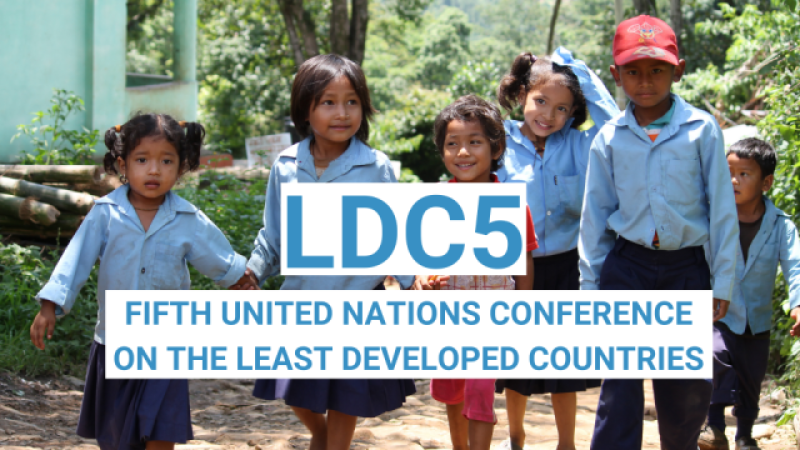- Youth participation vital to BD’s democratic future: C’wealth Group |
- Stocks retreat on week’s first trading day as turnover drops |
- Free education for girls up to honours if BNP wins: Zubaida Rahman |
- Dhaka ranks second worst in world for air pollution |
- Bangladesh stocks end week higher on upbeat mood |
Statement by G77 & China on Fifth UN Confce on LDC5, Doha

Fifth UN conference on LDCs held in Doha, Qatar.
H.E. Rodrigo Malmierca Diaz, Cuban Minister of Foreign Trade and Foreign Investment, delivered the following statement of G77 and China on 6 March at the General Debate of the ongoing Fifth United Nations Conference on the Least Developed Countries (LDC5) in Doha, Qatar:
Final Statement of the G77 and China for the General Debate of the Fifth United Nations Conference on Least Developed Countries (5-9 March 2023, Doha, Qatar) Your Excellencies, I am honored to make this statement on behalf of the Group of 77 and China. I wish to begin by conveying the profound gratitude of the G77 and China to the Government of the State of Qatar for hosting this Fifth UN Conference on Least Developed Countries. We deeply appreciate the efforts and commitments of the Qatari Government in support of the Least Developed Countries.
On behalf of the Group of 77 and China, I convey our deepest condolences and solidarity to the governments and peoples of Syria and Türkiye affected by devastating earthquakes that have caused the loss of tens of thousands of lives, victims and extensive material damages.
We meet today at a time of extremely critical juncture, in which developing countries face multiple challenges, particularly those concerning economic and social recovery from the aftermath of the COVID-19 pandemic, enormous financial and debt difficulties, rising food prices, escalating climate emergency and an unbalanced economic order that perpetuates inequalities and poverty.
It is totally unacceptable that the least developed countries, which are among the most vulnerable, still today continue to have the most limited productive capacity, insufficient fiscal space, have experienced a widening in their macroeconomic imbalances and rising levels of external indebtedness, together with less access to technologies, which definitely hampers their development in all areas. Half of the least developed countries underwent continuous food emergency for at least 13 consecutive years over a period of 42 years (1981-2022), which also has a severe impact on the well-being of their populations.
It is inconceivable that, although LDCs account for less than 4% of the world’s total greenhouse gas emissions, they are at the forefront of the climate crisis. In the last 50 years, 69% of global deaths from climate-related disasters occurred in LDCs. This situation cannot continue. We are facing an inequality crisis in which 46 countries comprising 14% of the world’s population risk being left behind, while in the last 10 years, the richest 1% of humanity has cornered more than half of all new global wealth. This is simply unacceptable.
The implementation of the Doha Programme of Action is an important step in the right direction. However, its timing coincides with the final years of action to achieve the 2030 Agenda and its SDGs, which will require a renewed global partnership, real solidarity and means of implementation at the level of LDCs’ requirements.
As a first step, access to Covid-19 vaccines and treatments cannot continue to be a challenge for LDCs. We must adequately and timely provide safe, quality, effective and affordable vaccines for this group of countries.
Secondly, we must confront the unsustainable debt burden in many LDCs and take urgent and necessary measures to reduce the debt situation if they are to return to normalcy. Immediate actions such as debt relief and restructuring, reallocation of unutilized Special Drawing Rights (SDRs) and a new allocation of SDRs are necessary.
Thirdly, it is imperative that developed countries meet their ODA commitments. These countries must fulfill their historic commitment to allocate between 0.15% and 0.20% of their GDP to ODA for the least developed countries.
The LDCs’ process of graduation to a higher stage must be re[1]evaluated to ensure the sustainability of the progress achieved in each case. It is unreasonable for LDCs, once graduated, to stop receiving specific treatment when their vulnerability is still evident. This is in line with the urgent need to measure sustainable development beyond GDP. Graduated LDCs would not face this reality if developed countries were to fulfill their commitment to contribute 0.7% of their GDP to Official Development Assistance, which is still a mere pipe dream today.
Fourthly, we need to enhance technology transfer and capacity building, as well as technological and scientific cooperation from developed countries to LDCs to promote sustainable development in its three dimensions and the full implementation of the 2030 Agenda.
We need to consolidate their involvement in global economic, social, environmental decision-making processes and address the structural problems aggravated by the current unjust economic order.
The G77 and China reiterates its solidarity with the least developed countries and reaffirms its willingness to resolutely support the implementation of the Doha Programme of Action within the framework of the South-South Cooperation and as a supplement to the cooperation to be undertaken by our developed countries partners. – Third World Network

